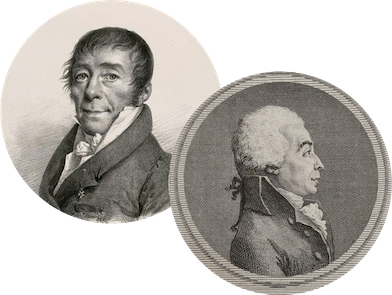The French Revolution and the subsequent reign of Napoleon was a tumultuous time that led to significant changes in and to the Basque Country. Before, the three provinces of Iparralde – Lapurdi, Zubero, and Nafarroa Beherea – had enjoyed some level of self-governance. For example, Lapurdi had the Biltzar, which was effectively a local parliament. The Garat brothers tried to maintain that unique position through the changes rocking France, and even proposed a unified Basque Country at one point.
- Dominique (1735) and Dominique-Joseph (1749) Garat Hiriart were from Ustaritz, a small town near Baiona, in Lapurdi to Pierre Garat and Marie Hiriart. Pierre was a doctor. Dominique, some 14 years older than his brother, was called “the Old.”
- Dominique the Old settled in Bordeaux, where he had studied law. As a speaker in the Bordeaux Parliament, he spoke passionately against the slave trade. His house became a prominent meeting place for local writers and artists, and it was during one of these gatherings that he met his future wife Françoise Gouteyron.
- Dominique-Joseph, after also completing his law studies in Bordeaux, moved on to Paris where he was a journalist and an editor for Mercure de France. He also began to teach philosophy and literature.
- Both brothers were elected to represent Lapurdi as part of the Third Estate in the Estates-General convened in 1789 in Versailles. Their primary goal was to maintain the political status quo of Lapurdi, as embodied by their General Meetings or Biltzar. Both brothers were swept away by the changes proposed by the assembly to get rid of all privileges, including the special foral customs of the Basques, which led to some criticism back home. Dominique the Old argued against incorporating the Basque provinces into a greater territory with Bearn, but his arguments fell on deaf ears.
- Dominique-Joesph was appointed Minister of Justice in 1792 by Georges Danton. He was told to deliver to King Louis XVI his sentence of execution by guillotine. A year later, he became Minister of the Interior, a disastrous tenure that saw him unable to curb rampant corruption. He resigned in August of 1793.
- Dominique the Old retired to Ustaritz, where he died in 1799. Before that, in 1795, he became president of the municipality, where he advocated, amongst other things, that a local teacher must know Basque so that the children don’t forget their language.
- Dominique-Joseph continued in politics, even trying to convince Napoleon to create a united Basque region. He went so far as to propose that the river Ebro be rerouted to separate the southern Basque provinces from Spain. He wanted to call this new entity New Phoenicia. However, political and military realities caused the plan to be abandoned and forgotten. He eventually retired to Urdains, near Uztaritze, and died in 1833.
Primary sources: Dominique Joseph Garat, Wikipedia; End of Basque home rule in France, Wikipedia; Dominique Garat, Wikipedia; Dominique Joseph Garat, Wikipedia; Martínez Artola, Alberto. Garat, Dominique Joseph (1749-1833). Auñamendi Encyclopedia. Available at: https://aunamendi.eusko-ikaskuntza.eus/en/garat-dominique-joseph-1749-1833/ar-52019/; Martínez Artola, Alberto; Batua Itzultzaile automatikoa; Arostegi, Agustín. Garat, Dominique (1735-1799). Auñamendi Encyclopedia. Available at: https://aunamendi.eusko-ikaskuntza.eus/en/garat-dominique-1735-1799/ar-60920/
Discover more from Buber's Basque Page
Subscribe to get the latest posts sent to your email.



Greetings,
very interesting!! the unification of the French and Spanish Basque is a dream–a dream that started in the XVI century. I remember when ETA was very active, some activists would cross over to the French side for protection from Spain’s authorities. Spain asked the French government to crack down on the French Basque who helped out ETA. The French government obliged. For a while, it was very difficult –ETA retaliated against French tourists–burning cars, assaulting tourists, stopping cars with French licenses plates to steal what ever they could take–it was ugly!! French tourists’ cars were not the only one with French plates–the French Basques did too!! and they were retaliated even more so than the tourists. That was an eye opener for them and food for thoughts!!!! Of course, it is fun to paint one’s face red and green and fly l’ ikurina in front of Sabino Arana on March 27 but the reality is: the French Basques enjoy and benefit from a better social system than in Spain–better health care, better pensions, better schools and the Basque language is welcome. In short, they know which side of the bread is buttered. Economics, good or bad is the reality of life.
ETA and Franco taught the obvious to the folks on both sides of the border that peace is by far more profitable than war.
Monique
New Phoenicia….
that is cerebral bad ass!